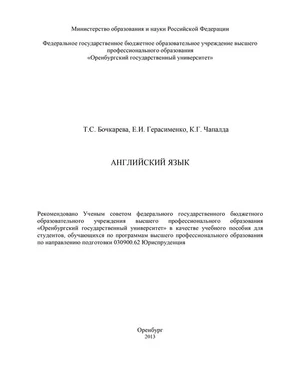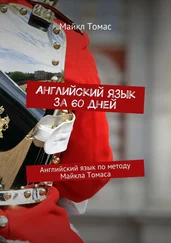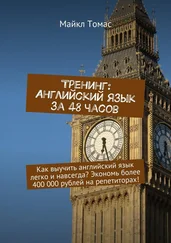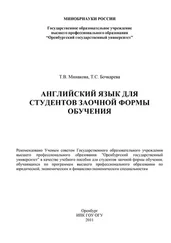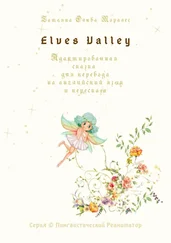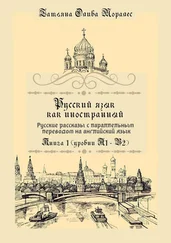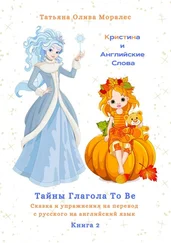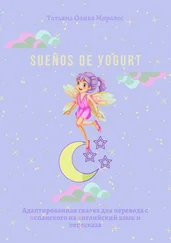Татьяна Бочкарева - Английский язык
Здесь есть возможность читать онлайн «Татьяна Бочкарева - Английский язык» — ознакомительный отрывок электронной книги совершенно бесплатно, а после прочтения отрывка купить полную версию. В некоторых случаях можно слушать аудио, скачать через торрент в формате fb2 и присутствует краткое содержание. Город: Оренбург, Год выпуска: 2013, Издательство: Литагент БИБКОМ, Жанр: Детская образовательная литература, foreign_language, Языкознание, на русском языке. Описание произведения, (предисловие) а так же отзывы посетителей доступны на портале библиотеки ЛибКат.
- Название:Английский язык
- Автор:
- Издательство:Литагент БИБКОМ
- Жанр:
- Год:2013
- Город:Оренбург
- ISBN:нет данных
- Рейтинг книги:3 / 5. Голосов: 1
-
Избранное:Добавить в избранное
- Отзывы:
-
Ваша оценка:
- 60
- 1
- 2
- 3
- 4
- 5
Английский язык: краткое содержание, описание и аннотация
Предлагаем к чтению аннотацию, описание, краткое содержание или предисловие (зависит от того, что написал сам автор книги «Английский язык»). Если вы не нашли необходимую информацию о книге — напишите в комментариях, мы постараемся отыскать её.
Английский язык — читать онлайн ознакомительный отрывок
Ниже представлен текст книги, разбитый по страницам. Система сохранения места последней прочитанной страницы, позволяет с удобством читать онлайн бесплатно книгу «Английский язык», без необходимости каждый раз заново искать на чём Вы остановились. Поставьте закладку, и сможете в любой момент перейти на страницу, на которой закончили чтение.
Интервал:
Закладка:
G. The system of policing by unpaid parish constables continued in England until the 19th century; in the London metropolitan area it was ended by the creation of the Metropolitan Police in 1829, and outside London by the County Police Act 1839, which allowed counties to establish full-time professional police forces. However, the term "constable" was still used by officers of the new police forces, and most outside London were headed by a chief constable. This system is still used today. The City of London Police is the territorial police force responsible for law enforcement within the City of London. The service responsible for law enforcement within the rest of Greater London is the Metropolitan Police Service , a separate organization.
1.1.2 Переведите следующие слова и выражения на русский язык:
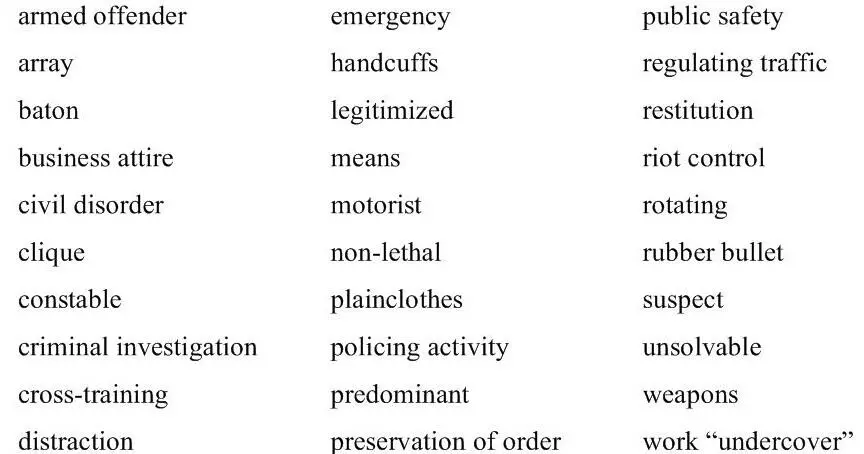
1.1.3 Прочитайте следующие утверждения и укажите, являются ли они верными:
1) Police forces are usually organized and funded by some level of government.
2) The term “constable” was still used by officers of the new police forces, and most outside London were headed by a chief constable.
3) Law enforcement constitutes major part of policing activity.
4) The City of London Police is the territorial police force responsible for law enforcement in London.
5) Police officers often carry handcuffs to restrain suspects.
6) In many jurisdictions police officers carry weapons in the normal course of their duties.
7) Police functions include protecting life and property.
8) “Plainclothes” officers often dress in business attire.
9) Police may also take on administrative duties, such as issuing firearms licenses.
10) Police detectives are responsible for investigations and detective work.
1.1.4 Переведите текст со словарем.
1.1.5 Составьте 10 вопросов к тексту.
1.1.6 Выберите ключевые предложения, перескажите текст, используя выражения: «The subject of the text is…», «The text deals…», «The main idea of the text is…», «The author comments on …».
1.2 Модуль 2. Текст Courts of England and Wales
1.2.1 Прочитайте и переведите текст. Запомните следующие выражения:
1) assizes − ассизы, выездные сессии суда присяжных (созывались в каждом графстве не меньше 3 раз в год);
2) binding − обязывающий, обязательный, имеющий обязательную силу, связующий;
3) ecclesiastical body − церковная организация;
4) Employment Tribunal − промышленный трибунал, суд по трудовым делам;
5) Family Proceedings Court − суд по семейным делам;
6) lay magistrate (justice of the peace) − мировой судья (рассматривает мелкие гражданские и уголовные дела; не имеет юридического образования и не получает денежного вознаграждения);
7) magistrates’ court – суд магистратов (рассматривает дела о мелких уголовных и гражданских преступлениях);
8) Quarter Sessions – суд четвертных (квартальных) сессий;
9) Privy Council – Тайный совет;
10) Queen’s Bench Division – Отделение королевской скамьи Высокого суда правосудия (осуществляет надзор за низшими судами; рассматривает важнейшие уголовные дела);
11) trier of fact – лицо, решающее вопрос факта (напр. эксперт, выступающий в суде).
Her Majesty's Courts of Justice of England and Wales are the civil and criminal courts responsible for the administration of justice in England and Wales; they apply the law of England and Wales and are established under Acts of the Parliament of the United Kingdom.
The United Kingdom does not have a single unified judicial system − England and Wales have one system, Scotland another, and Northern Ireland a third. There are exceptions to this rule; for example in immigration law, the Asylum and Immigration Tribunal's jurisdiction covers the whole of the United Kingdom, while in employment law there is a single system of Employment Tribunals for England, Wales, and Scotland (but not Northern Ireland). The Court of Appeal, the High Court, the Crown Court, the Magistrates' Courts, and the County Courts are administered by Her Majesty's Courts Service, an executive agency of the Ministry of Justice. The Supreme Court is the highest appeal court in almost all cases in England and Wales. Prior to the Constitutional Reform Act 2005 this role was held by the House of Lords. The Supreme Court is also the highest court of appeal for devolution matters, a role previously held by the Privy Council . The Privy Council is the highest court of appeal for a small number of Commonwealth countries, colonies and the Channel Islands and the Isle of Man. There are a number of smaller statutory jurisdictions, such as appeals from ecclesiastical and professional bodies. The judges who sit on the Judicial Committee of the Privy Council are also the members of the Supreme Court.
The Court of Appeal deals only with appeals from other courts or tribunals. The Court of Appeal consists of two divisions: the Civil Division hears appeals from the High Court and County Court and certain superior tribunals, while the Criminal Division may only hear appeals from the Crown Court connected with a trial on indictment. Its decisions are binding on all courts apart from the Supreme Court. The Crown Court is a criminal court of both original and appellate jurisdiction which in addition handles a limited amount of civil business both at first instance and on appeal. It replaced the Assizes whereby High Court judges would periodically travel around the country hearing cases, and Quarter Sessions which were periodic county courts. The Old Bailey is the unofficial name of London's most famous Criminal Court, which is now part of the Crown Court. Its official name is the "Central Criminal Court". The Crown Court also hears appeals from Magistrates' Courts. The Crown Court is the only court in England and Wales that has the jurisdiction to try cases on indictment and when exercising such a role it is a superior court in that its judgments cannot be reviewed by the Administrative Court of the Queen’s Bench Division of the High Court.
Subordinate courts.The most common subordinate courts in England and Wales are the Magistrates' Courts, Family Proceedings Courts, Youth courts and County Courts. Magistrates' Courts are presided over by a bench of lay magistrates (or justices of the peace), or a legally-trained district judge, sitting in each local justice area. There are no juries. They hear minor criminal cases, as well as certain licensing applications. Youth courts deal with offenders aged between the ages of 10 and 17 inclusive. Youth courts are presided over by a specially trained subset of experienced Adult Magistrates or a District Judge. In addition some Magistrates' Courts are also a Family Proceedings Court and hear Family law cases including care cases and they have the power to make adoption orders. Family Proceedings Courts are not open to the public. County Courts are statutory courts with a purely civil jurisdiction. They are presided over by either a District or Circuit Judge and, except in a small minority of cases such as civil actions against the Police, the judge sits alone as trier of fact and law without assistance from a jury. County courts have divorce jurisdiction and undertake private family cases, care proceedings and adoptions. However, in general any county court in England and Wales may hear any action and claims are frequently transferred from court to court.
Читать дальшеИнтервал:
Закладка:
Похожие книги на «Английский язык»
Представляем Вашему вниманию похожие книги на «Английский язык» списком для выбора. Мы отобрали схожую по названию и смыслу литературу в надежде предоставить читателям больше вариантов отыскать новые, интересные, ещё непрочитанные произведения.
Обсуждение, отзывы о книге «Английский язык» и просто собственные мнения читателей. Оставьте ваши комментарии, напишите, что Вы думаете о произведении, его смысле или главных героях. Укажите что конкретно понравилось, а что нет, и почему Вы так считаете.
